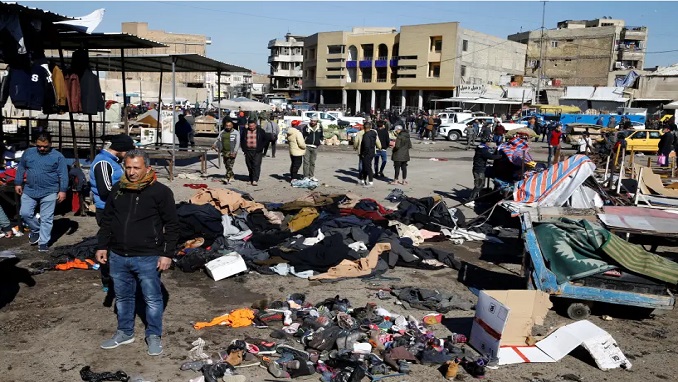The Daesh terrorist group has claimed responsibility for the rare and deadly twin suicide bombing that rocked central Baghdad killing over 30 and wounding dozens, Arab News reports.
The group said the bombing “targeted apostate Shiites,” on a statement circulating in an Daesh-affiliated website late Thursday. The statement said the first bombing was carried out by Abu Youssef Al-Ansari and the second by Mohammed Arif Al-MuHajjir.
At least 32 people were killed and over 110 people wounded in the blasts on Thursday. Some were in severe condition. According to officials, the first suicide bomber cried out loudly that he was ill in the middle of the bustling market, prompting a crowd to gather around him — and that’s when he detonated his explosive belt. The second detonated shortly after.
After the incident, a spokesman for the Iraqi commander-in-chief said that the attackers were being pursued by the country’s security forces when they detonated explosive devices. The attack is the first twin bombing in Baghdad since January 2018, when 35 people were killed and 90 injured in the same square that was hit on Thursday.
ISIL remains operational
Al Jazeera’s Simona Foltyn said despite the Iraqi government declaring it has territorially defeated Daesh, the group never really went away.
“Daesh had a relatively seamless transition into an insurgency and even though it was pushed out from the urban areas into the rural areas, it continued to operate and stage attacks on security forces and checkpoints in remote areas,” she said, speaking from Baghdad.
Iraq’s Foreign Minister Fuad Hussein has acknowledged that Daesh is still a threat, and that the country needed support from the region and international countries, she continued.
“But we also have to say it is really difficult to quantify how strong an organisation really is,” Foltyn added. “We do know that the US-led coalition to fight ISIL underreports cases of attacks by Daesh especially in remote rural areas because they rely on Iraqi security forces to report the cases.”
4 Senior Security Officials Fired
Iraqi Prime Minister Mustafa Al-Kadhimi has dismissed four high-ranking security officials, including the country’s federal police head, following the twin terrorist attacks in the capital of Baghdad, Yehia Rasool, a spokesperson for the Iraqi commander-in-chief, said.
“Al-Kadhimi issues orders on major changes in the security services: the deputy interior minister for intelligence affairs, Lt. Gen. Amer Saddam, was dismissed from his post, and Lt. Gen. Ahmed Abu Ragheef was assigned to replace him,” Rasool wrote on Twitter.
In addition, the director-general of the interior ministry’s intelligence and counter-terrorism department, Abdul Karim Abd Fadel, the federal police commander, Lt. Gen. Jaafar al-Battat, and the chief of the intelligence and security department of the Baghdad operational headquarters, Bassem Majeed, were fired against the backdrop of the twin blast.
The head of the Baghdad operational headquarters, Qais al-Muhammadawi, has been transferred to another post in the country’s Ministry of Defence, according to Rasool. Al-Khadhimi hailed the citizens’ “resolve” against Daesh’s heinous crime.
“Our people have proven their resolve in the face of Daesh’s terrorism,” he said on Twiiter, referring to ISIL by their acronym in Arabic. “The will to live among our people as they face terrorism in the scene of the heinous crime at Bab al-Sharqi was a message of defiance and unparalleled courage.”
President Barham Saleh led political figures in condemning Thursday’s attack, saying the government would “stand firmly against these rogue attempts to destabilise our country”.
Biden administration’s first challenge
The bombing, four kilometers from the US embassy compound, occurred in an area which has witnessed several mass protests over the last year and a half.
The attack could present the Biden administration with one of its first foreign crises. The US left Iraq in 2011 but then returned in 2014 at the invitation of the Iraqi government to help lead a coalition against ISIS. The US has trained and mentored around 250,000 Iraqi troops with the support of dozens of members of the coalition. These include European countries.
The US is also supporting training and equipping of the Kurdish Peshmerga in northern Iraq. When US-Iran tensions rose in 2019 and early 2020, and the US killed Iranian IRGC head Qasem Soleimani in Baghdad, many foreign advisers left. The Covid-19 virus has also reduced training.
The bombing provides US President Joe Biden with an early opportunity to show US support for Iraq. Biden has said that the US is “back” and the world can expect the US to care again about foreign policy and work multilaterally to solve problems. Iraq is a very complex problem. The pro-Iranian groups want the US to leave. Groups like Ashab Kahf and others linked to Iran are threatening people who work as interpreters, for instance, according to a tweet by the BBC’s Nafiseh Kohnavard.
Elections looming
The attack comes as Iraqis prepare for a parliamentary election. Prime Minister al-Kadhimi had originally set this year’s general election for June, nearly a year ahead of schedule, in response to widespread protests in 2019.
In a meeting Monday between Kadhimi and President Barham Salih, both sides reiterated “the need to consolidate stability in the country, preserve the security and safety of citizens, strengthen the authority of the security services and enforce the law, protect community peace and security, prevent illegal actions and control fugitive weapons.”
But Iraq’s Cabinet members voted unanimously Tuesday to postpone this year’s general elections from June 6 until October 10, according to the state news agency INA. The decision came after the country’s electoral commission urged more time to organize the polls in order to conduct free and fair elections. The postponed vote would still be a year earlier than the official end date of parliament’s term in 2022.
